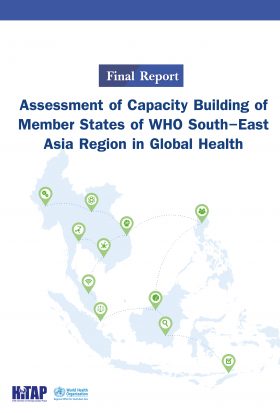This website uses cookies so that we can provide you with the best user experience possible. Cookie information is stored in your browser and performs functions such as recognising you when you return to our website and helping our team to understand which sections of the website you find most interesting and useful.
Research report: Assessment of Capacity Building of Member States of WHO South-East Asia Region in Global Health

Details
The term “global health” has emerged as part of the larger political and historical process, replacing the term “international health” to imply a shared global responsibility for health. The General Assembly of the United Nations highlighted the relations of “Global health and foreign policy and indicated the need to increase the capacity of and raise levels of training of diplomats and health officials in global health diplomacy. In South-East Asia Region (SEAR), Member States were urged by the Regional Committee in 2010 to establish policies and programs for capacity building in global health of concerned staff who would be representing their respective governments at high-level policy and program meetings.
This study aims to provide an insight on the introduction of resolution (RC63/R6) on capacity building in global health of Member States during 2011 to 2015, in response to resolution RC63/R6 for reporting to the Seventieth session of the Regional Committee of the WHO South-East Asia Region, to be held in September 2017. The study used quantitative and qualitative approaches to explore the development and practice of global health capacity building in the region. It provides strengths, weaknesses and impact of capacity building activities in the region, and also enabling and impeding factors that affect capacity building in global health development.




